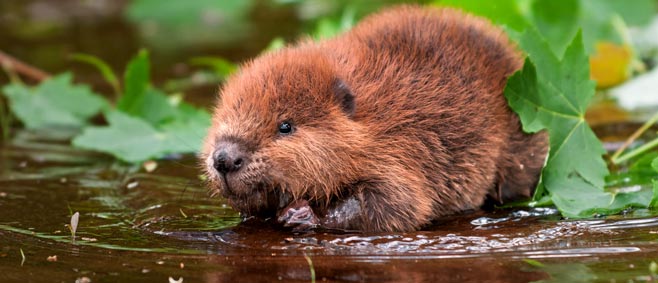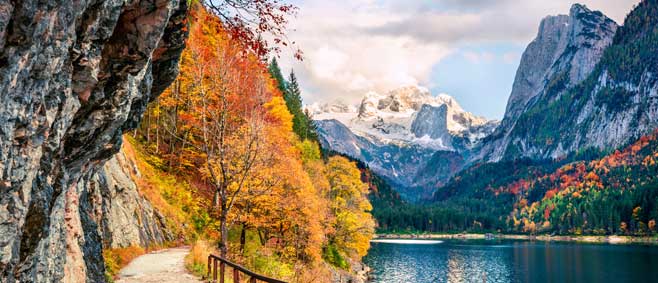Fisheries, wildlife, and conservation sciences
A blend of scientific knowledge and a passion for the natural world can help you ensure that the planet’s fish, wildlife and their habitats can thrive amid growing environmental pressures. And earning a bachelor’s degree in fisheries, wildlife, and conservation sciences online from Oregon State University will give you the skills to think critically, evaluate problems and make vital decisions that help maintain balance for species and habitats in the wild.
This is an applied, science-based program that offers active learning opportunities for you to assess animals, plants and habitats in the real world. You’ll develop the knowledge to build a rewarding career where you can help recover endangered species, restore habitats and ecosystems, understand how human decisions impact conservation, educate communities and much more.
Skills you’ll gain in OSU’s online fisheries, wildlife, and conservation sciences degree program
As a student in Oregon State’s online fisheries, wildlife, and conservation sciences degree program, you’ll gain the in-demand skills you need to stand out in the job market and level up your career. You’ll learn from expert Oregon State faculty who have real-world experience in the field.
- Fish, avian and wildlife conservation
- Population dynamics
- Marine ecology
- Animal genetics
- Vertebrate physiology
- Habitat restoration
- Animal care and rehabilitation
- Ecosystem ecology
Program details
The coursework in Oregon State’s online fisheries, wildlife, and conservation sciences bachelor’s program will prompt you to get outside, conduct assignments in the field, gain work experience and, in some cases, conduct independent research projects. The core courses will help you acquire the educational foundation of fish and wildlife conservation.
The online fisheries, wildlife, and conservation sciences program is offered by Oregon State’s College of Agricultural Sciences.
Degree requirements
A minimum of 180 quarter credits — at least 60 of which must be upper-division credits — are required to graduate with your degree in fisheries, wildlife, and conservation sciences, including:
- OSU’s Core Education
- Major requirements: Fisheries, wildlife, and conservation sciences

Additional program features
Internships
In order to graduate, students in the program are required to complete two internship courses: an exploratory internship for 1 credit and intensive internship for 3 credits. Learn more about the internship requirement on the FWCS department website. State of Colorado: This program requires an internship. Although Oregon State University participates in the National Council of State Authorization Reciprocity Agreement (NC-SARA), due to Colorado’s Workers’ Compensation Act, we have limited authorization to offer programs that require internships in the state of Colorado. The Colorado internship site must provide workers’ compensation. In some cases, a proposed internship site may not provide workers’ compensation insurance and, as a result, is not available as an internship site. Please contact Shannon Riggs, associate vice provost for educational programs and learning innovation, with questions.
Transfer credits
Some degree requirements may be transferred from other institutions. Please note that a minimum of 45 credits of the last 75 credits in this degree program must be completed at Oregon State (online or on campus) to meet the academic residency requirement.
Previously earned credits must be reviewed upon admittance to OSU for appropriate articulation. Additional information about transferring credits is available through OSU’s Transfer Credit Central.
Pursue an honors degree online
As an undergraduate degree-seeking student, you can apply to earn an honors degree online in your academic major. Earning this prestigious degree gives you the opportunity to collaborate with faculty on research, complete a comprehensive thesis experience and engage in co-curricular activities.
A national award-winning online program
Oregon State’s fisheries, wildlife, and conservation sciences bachelor’s program is a winner of the Online Learning Consortium’s John R. Bourne Outstanding Online Program Award. This is one of the most prestigious awards given in the field of online learning and is based on the program’s track record of student success and faculty satisfaction.
Explore certificates and microcredentials
You can gain highly specialized skills that are in demand by employers — and do it with less of a time and financial commitment — when you earn a certificate or microcredential online with Oregon State. Choose from a large collection of short-form offerings that can help you upskill quickly.
Careers related to fisheries, wildlife, and conservation sciences
The knowledge you acquire in Oregon State’s online fisheries, wildlife, and conservation sciences degree program will help you fill in-demand jobs in the global marketplace. As a leader in this area, you’ll enter the workforce ready to provide insights in economic sectors that need fisheries and wildlife experts.
Job market outlook
Use the interactive tool on this page to discover employment trends, top occupations and salary details for professionals who have skills related to fisheries, wildlife, and conservation sciences. Please be aware that completing a program related to the job market information shown here does not guarantee employment or a specific salary.
Request
information
To ensure that you receive emails from us, please add "ecampus@oregonstate.edu" and these domains to your safe senders list: “@oregonstate.edu,” “@discover.oregonstate.edu” and “@email.oregonstate.edu.”
† All mobile information you share will remain confidential and will never be given to external sources. Any costs associated with receiving a text message are the responsibility of the individual receiving the message. Opting in to this mobile text messaging service from Ecampus is free of charge, however, message and data rates may apply from your wireless carrier.
Contact
Our enrollment services team can help answer questions about online learning at Oregon State Ecampus and how to get started.
8 a.m-4 p.m. PT Monday-Friday
Contact Ecampus or book an appointment
To ensure that you receive emails from us, please add "ecampus@oregonstate.edu" and these domains to your safe senders list: “@oregonstate.edu,” “@discover.oregonstate.edu” and “@email.oregonstate.edu.”





